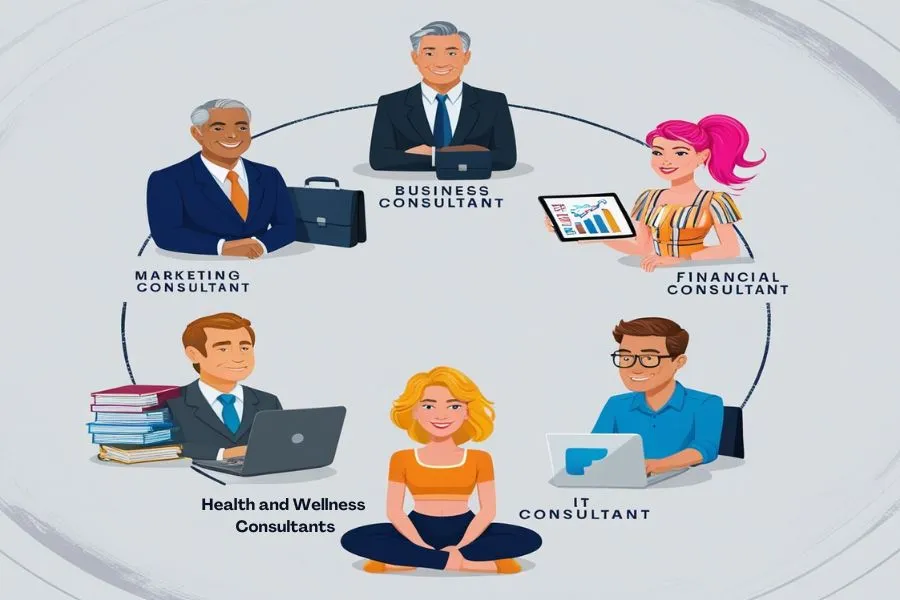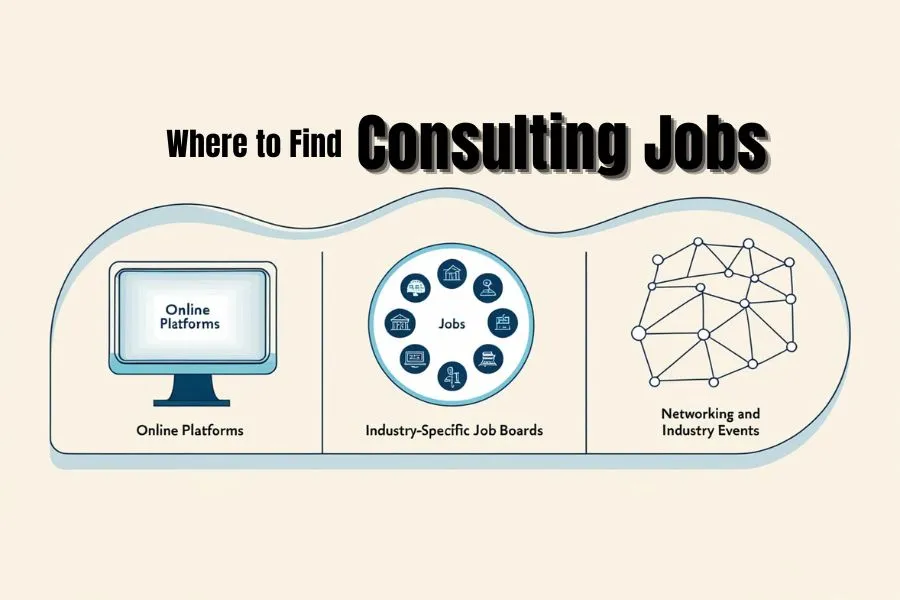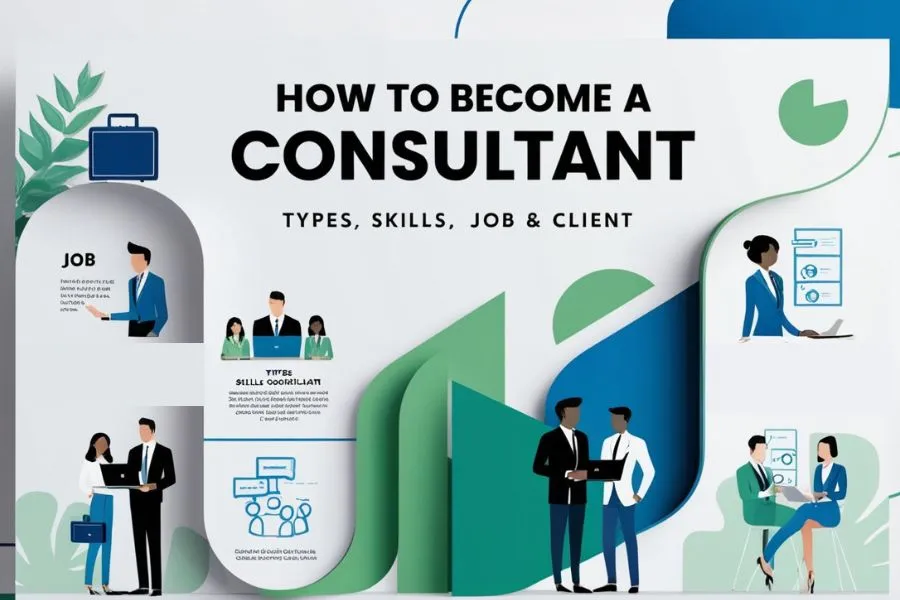Table of Contents
What is a Consultant?
How to become a consultant? A consultant is a professional who provides expert advice in a specific area to help organizations or individuals solve problems, improve performance, or achieve their goals. They analyze data, offer strategic solutions, and implement changes to create measurable impact. In this blog, we will explore 12 steps: how to become a consultant, types of consultants, what does a consultant do?, consultant qualifications, consultant skills, where to find consulting jobs, and how to find consulting clients!
Types of Consultants

1. Business Consultants
These experts focus on optimizing company processes, improving efficiency, and driving growth.
2. Marketing Consultants
Specialized in branding, digital strategies, and campaigns to enhance customer engagement.
3. Financial Consultants
They provide guidance on investments, budgeting, and financial planning.
4. IT Consultants
Focus on technology solutions, system integrations, and cybersecurity.
5. Health and Wellness Consultants
Help individuals or organizations promote healthier lifestyles and workplace wellness.
12 Steps: How to Become a Consultant
Step 1: Identify Your Niche
Choose a specialization that matches your expertise and interests.
Example: Sarah chooses digital marketing as her niche, focusing on helping small businesses optimize their online presence, social media engagement, and ad campaigns.
Step 2: Gain Relevant Experience
Work in roles that build your skills and credibility.
Example: Sarah works as a social media manager for two years, gaining hands-on experience with platforms like Instagram, Facebook, and Google Ads. She also takes freelance projects for content creation and SEO audits.
Step 3: Build Your Personal Brand
Create a strong online presence through social media and a professional website.
Example: Sarah creates a professional LinkedIn profile showcasing her achievements, writes blog posts about digital marketing trends, and starts an Instagram page sharing actionable tips for small businesses.
Step 4: Create a Business Plan
Outline your target market, services, and financial goals.
Example: Sarah outlines her target market (small businesses in e-commerce and hospitality), services (social media strategy, SEO, and PPC campaigns), and financial goals (earning $50,000 in her first year).
Step 5: Set Your Pricing
Research industry rates and define your pricing structure.
Example: After researching competitors, Sarah decides to offer a pricing structure of $100 for one-time consultations, $500 for monthly packages, and custom quotes for long-term projects.
Step 6: Build a Portfolio
Showcase case studies, testimonials, and past projects.
Example: Sarah creates a portfolio website with case studies of her previous freelance projects, showing how her strategies increased web traffic by 40% and boosted social media engagement by 60%.
Step 7: Network Strategically
Attend industry events and engage with potential clients.\
Example: Sarah attends digital marketing webinars and local business meetups. She introduces herself as a consultant, distributes business cards, and actively participates in relevant discussions.
Step 8: Develop Marketing Strategies
Like email campaigns, content marketing, & Search Engine optimization to attract clients.
Example: Sarah uses her expertise to run a content marketing campaign on LinkedIn, launches a monthly email newsletter offering free marketing tips, and optimizes her website for SEO to rank for keywords like “Consultant for digital marketing for new/small businesses.”
Step 9: Leverage Technology
Use tools like CRM software to streamline your processes.
Example: Sarah uses tools like HubSpot for client relationship management, Canva for content creation, and Google Analytics to track and report campaign performance.
Step 10: Pitch Your Services
Craft compelling proposals tailored to client needs.
Example: Sarah crafts customized proposals for potential clients, highlighting how her strategies will specifically address their business challenges and achieve measurable results.
Step 11: Deliver Exceptional Results
Focus on exceeding client expectations to build trust and loyalty.
Example: Sarah consistently exceeds her clients’ expectations, such as doubling their website traffic within three months or achieving a 300% ROI on ad campaigns, which earns her glowing testimonials.
Step 12: Ask for Feedback and Referrals
Happy clients can open doors to new opportunities.
Example: After completing projects, Sarah asks clients for detailed feedback and referrals. She also offers discounts for referrals, which helps her gain new clients through word-of-mouth recommendations.
What Does a Consultant Do?
1. Diagnose the Problem:
- Active Listening: Consultants carefully listen to clients to fully understand their challenges and goals.
- In-depth Analysis: They conduct thorough research and analysis to identify the root causes of problems.
2. Prescribe the Solution:
- Strategic Thinking: Consultants develop innovative and actionable strategies tailored to the client’s specific needs.
- Expert Advice: They provide expert guidance and recommendations based on industry best practices and their own knowledge.
3. Implement the Solution:
- Collaborative Approach: Consultants work closely with clients to implement the proposed solutions.
- Hands-on Support: They offer practical assistance and support throughout the implementation process.
Consultant Qualifications
Educational Background
- Minimum Requirement: A bachelor’s degree in a relevant field, such as business administration, engineering, or computer science.
- Preferred Qualifications: Advanced degrees, like an MBA or a master’s degree in a specialized field, can enhance a consultant’s credibility and expertise.
Certifications and Specialized Training
- Industry-Specific Certifications: Certifications tailored to specific industries, such as healthcare, finance, or IT, can demonstrate in-depth knowledge and skills.
- Generalist Certifications: Certifications like PMP (Project Management Professional) or Six Sigma can be valuable for consultants working across various industries.
- Continuous Learning: Ongoing professional development through workshops, seminars, and online courses is essential to stay updated with industry trends and best practices.
Consultant Skills
Communication and Interpersonal Skills
- Build strong client relationships through clear and effective communication
- Actively listen to client needs and tailor solutions accordingly
- Present complex ideas in a concise and understandable manner
Analytical and Problem-Solving Skills
- Identify root causes of problems and develop innovative solutions
- Leverage data-driven insights to inform decision-making
- Conduct thorough research and analysis to support recommendations
Time Management and Organizational Skills
- Prioritize tasks effectively and meet tight deadlines
- Manage multiple projects simultaneously without compromising quality
- Adapt to changing priorities and unforeseen challenges
Where to Find Consulting Jobs

1. Online Platforms
Freelance Marketplaces:
- Upwork: https://www.upwork.com/
- Freelancer: https://www.freelancer.com/
- Guru: https://www.guru.com/
Professional Networking Sites:
- LinkedIn: https://www.linkedin.com/
2. Industry-Specific Job Boards
- Consulting.com: A platform dedicated to consulting jobs and resources.
- Consultancy.uk: A UK-based platform for consulting roles.
3. Networking and Industry Events
- Industry Conferences: Attend conferences related to your niche to connect with potential clients and employers.
- Professional Associations: Join associations to network with peers and access job boards.
- Alumni Networks: Leverage your alumni network to find opportunities.
How to Find Consulting Clients
1. Leverage Social Media:
- Optimize your LinkedIn profile.
- Share valuable content on LinkedIn and Instagram.
- Engage with your network.
2. Build Referral Networks:
- Delight your clients.
- Cultivate strong relationships.
- Seek referrals.
Conclusion
Becoming a consultant is a journey of self-discovery, learning, and continuous improvement. Whether you’re passionate about solving business problems or empowering individuals, this career path can be incredibly fulfilling.
FAQs
1. What qualifications do you need to become a consultant?
You typically need a degree in your field, relevant experience, and industry certifications.
2. How long does it take to become a consultant?
It depends on your background and niche. It may be a few months to several years.
3. What is the average income for consultants?
Salaries vary widely but can range from $50,000 to over $200,000 annually, depending on experience and specialization.
4. Do you need a business license to become a consultant?
In most cases, yes, to comply with legal requirements in your region.
5. How do you grow a consulting business?
Focus on delivering results, networking, and staying updated on industry trends.

